Books
Books
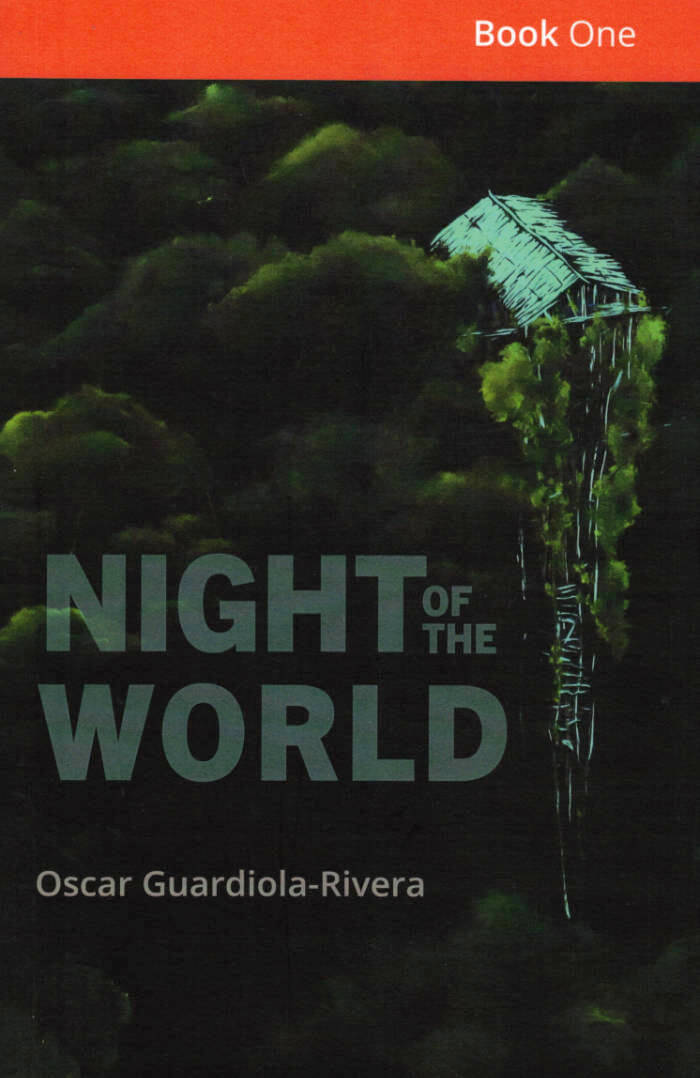
Night of the World: Book One
“This exhilarating novel-poem situated in a dystopian future, is a quest to find out what is distinctive about humankind, a poetic and vigorous praise of reading, knowledge and art as the only way to survive. The Night of the World makes indeed a beautiful, powerful and meaningful reading that stays with you for a long time.” — Cristina Fuentes De La Roche OBE, Hay Literary Festival International Director
Oscar Guardiola-Rivera is the author of two critically acclaimed books, What If Latin America Ruled the World?(Bloomsbury, 2010) winner of the Frantz Fanon Award, and Story of a Death Foretold (Bloomsbury, 2013) shortlisted for the 2014 Bread & Roses Award. More recently, In Defence of Armed/Art Struggle (Bogota: UTadeo, 2019), “A Future for the Philosophy of Liberation” in Decolonising Ethics (Pennsylvania University Press, 2020), and the poem Night of the World (The 87 Press, forthcoming 2021). Professor at the University of London.
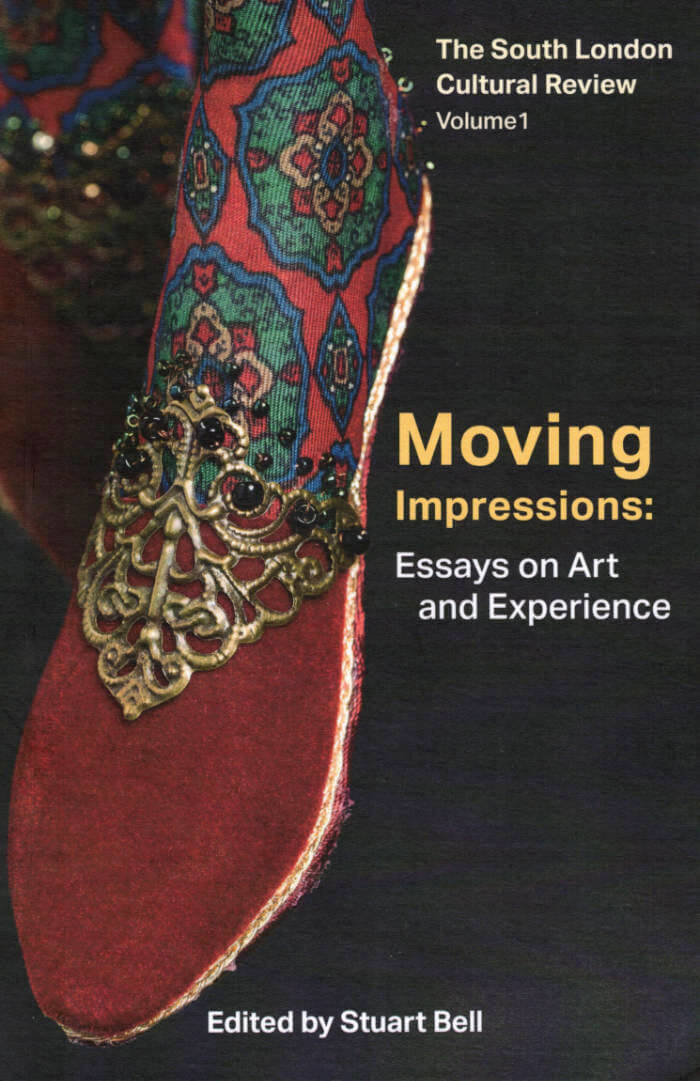
The South London Cultural Review #1: Moving Impressions
A collection of 12 essays written by academics, writers and thinkers, Moving Impressions: Essays on Art and Experience celebrates the artistic and cultural works which have inspired, and continue to inspire, this volume’s contributors as scholars, teachers, and writers. The chapters celebrate the ‘moving’ power - personal and political - of works which engage with questions of identity, race, self-and-other relations, and sexuality.
These highly personal chapters span a multitude of artists, particularly writers of colour, through exploration of their applications to neurodiversity, POC and LBGTQ+ communities, and feminism. Works explored are diverse in origin and heritage, spanning personal and political culture from South Africa to Trinidad, India to France, Nepal to The United Kingdom. These include autobiography, novels, short stories, plays, painting, sculpture, and film.
Essays by Rowland Abiodun, Stuart Bell, Amrita Dhar, Natalya Din-Kariuki, Oscar Guardiola-Rivera, Madhu Krishnan, Isabelle McNeill, Maryam Mirza, Adam Roberts, Laura Seymour, Kirsten Tambling, Emma Wilson.

Simmering of a declarative void
"This is a book of poetry that looks, really looks, at malign societal shapes and holds its stare. In the rhythmic scenes that are drawn like grotesques, we see the glistening, puke redolent props of normal life and its ‘bee-white’ regresses; we see an immersive performance art piece featuring a live job interview; the historical transfigurations of a bridge; we see MINT. CATS…Like all good, quick wit the ‘whatness’ of before and after spit back at each other. Thank goodness for this radical poetic satire, with line-breaks that bite into systems’ supposed inevitables; ‘an advert is / for what happens anyway’. The voice is not cold and cynical, but cunning and frangible, always kindling new ways to kick to pieces the the amygdala trick, if you love your job you’ll never work a day in your life!, and to kill the cop in your head. The crafted lyric sloshes between ballad forms, to Bill Griffiths-like textual play of talented sounds and nasty phrases that make you make observations, notice your feelings. In the excellent final poem of first water, ‘IN IT’ the speaker says, “my landlord is nervous when / we meet / at the centre of that nervousness / is a precious oil / I must extract”. This book is written with something like that oil, something like the toxins of meeting points; worker debt, worker time, worker body. I read this and wondered to the simmering, declarative void of myself, can a poem destroy admin!? Perhaps, but only on the basis that both a poem and an admin contain instructions to remember that someone existing after you has to do this too." – Holly Pester, author of Go to reception and ask for Sara in red felt tip
Robert Kiely is current Poet-in-Residence at University of Surrey. simmering of a declarative void is his first book, soon to be followed by a critical essay, Incomparable Poetry, from punctum.

Hopelessness
"The brilliant Verity Spott has a new book out, called Hopelessness and published by the 87 Press. The work defies categorisation: Verity is a poet, and this book is certainly poetry, but large parts are in prose form and towards the end it even takes on the structure of an absurdist play. There seems to be a loose narrative, and even recurring character voices, so I’m tempted to call it a short experimental novel, in the vein of Kenneth Patchen’s The Journal Of Albion Moonlight (a personal favourite). Ultimately though I’d just call it a book; one full of words that are profound, moving, silly, sad, challenging and beautiful in equal measure. Even though it’s still a boldly experimental piece, in some ways Hopelessness feels like the most accessible thing Verity’s done. Without wanting to sound condescending, it’s also the most mature. You don’t get much more universal than death, love and loss, and these seem to be the main themes explored here. Another is language itself, the way it defines and limits our experience, and the way that we’re constantly at the mercy of words and phrases as they’re deployed by the authorities, the media, and eventually our own thought processes. Dissenting voices continually talk over one another throughout Hopelessness, often sampled from outside sources, or parodies thereof: Sappho, MR James, traditional hymns and folk songs, Hollywood movies, talk radio, tabloid newspapers, dreams and demagogues. Through it all there’s a painful lesson about how loss can make us bitter and hard, and how by refusing to move forward we become empty caricatures mouthing meaningless clichés to wound and hurt. But grief and loss can also teach us about love, if we let them, and there is so much grief and love in this book. Verity continually rearranges reality (that is, language) as if searching desperately for a way out, but in the end, as always, there is just life, love, and death. Hopelessness is a bravura performance, wholeheartedly recommended." — Ben Graham
Verity Spott is a poet from Brighton. Verity is the author of several books including Hopelessness (the 87 Press), Click Away Close Door Say (Contraband Books), We Will Bury You (Veer Books) and Poems of Sappho (in translation, Face Press). From 2018 to 2019 Verity was Poet in Residence at the University of Surrey. Verity teaches poetry in Brighton with The Creative Writing Programme and (alongside Kat Addis) with the Hollingdean Wednesdays project where they hold a poetry reading and writing group in Hollingdean Community Centre. Verity's poems have been translated into Greek, Spanish, Portuguese, Dutch and German and their book Hopelessness has been translated into French and published by Même pas l'hiver. Verity plays cello in the improvised tune duo Benzo Fury and the free jazz trio In Threads. Since 2006 Verity has run the monthly poetry, performance and music event Horseplay.
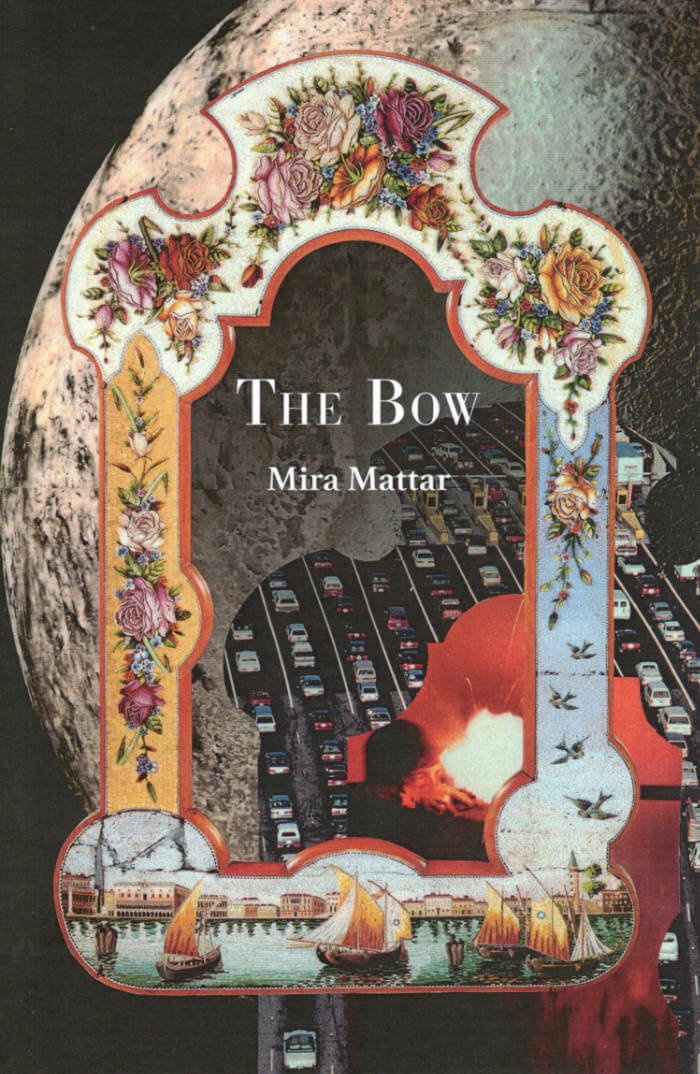
The Bow
The Bow is a collection steeped in the pains and pleasures of impermanence. Mattar’s densely populated poems lyrically dart between entangled histories and contested presents, immersing the reader in the fleshy undercurrent of contemporary life. Writhing with sensitivity and tumult, this is a work of slippery power. – Momtaza Mehri
Taking on false conceptions of mistaking “a walled garden for the world,” Mira Mattar proves the always new and always ancient tools of poetry help us love the world as it is, not as it was, and not as we wished or hoped. These poems destroy lies to buzz around us no more. – CAConrad
Mira Mattar writes fiction and poetry. She is an independent researcher, editor, and tutor. She is a Palestinian and Jordanian from London, where she lives and works. Her novel, Yes, I Am A Destroyer was published in 2020 by Ma Bibliothèque and her chapbook, Affiliation, was published in 2021 by Sad Press. The Bow is her first collection of poems.

Fleshed Out For All The Corners Of The Slip
This major new work is thought, spirit and sense (in every sense) ‘fleshed out’ in ‘all the corners’ by being unmade – as poetry, as music, as (black and white) images, and as attention to the interconnected circuitries the One has with the social, historical and environmental ‘to / link us outside’. These elements are no sooner embodied than they slip, shift, carousel and spin away. As Goodwin puts it: ‘no longer a bodily reference to an individual subject’s presence; not obliterated but made into an element, air or breath, as black poetry’s condition of im/possibility for, and refusal of subjecthood.’ Hence it is that this poetry achieves ‘flightacross precipitous intransigence’ (Will Alexander), perhaps flights of manifestations of spirit, ‘ghostly crowned / apogees’, like duppies, which is to say, sacred. Hence too the work’s urgent task to avoid ‘thingification’: the conscription and exploitation of thought &/or body for neo-colonialist, which is to say, neo-liberal ends. Goodwin eschews identity politics for a phenomenology that is more properly radical in both the etymological sense of the term – rooted and vital to life – as well as situated within a history of experimental black thought which, simultaneously, rejects normative traditions of meaning, signification and value. Both meanings are central to the anti-racist core of this important work – ‘when i don’t know you but you must know who i am’ – in a poetry that’s as breath-taking as it is breath-making. ‘Inexpressibly full with what words can do’.
— Emily Critchley, author of Home (London: Protoype, 2021), Arrangements (Shearsman Books, 2018) and Ten Thousand Things (UEA: Boiler House Press, 2017)
James Goodwin is a poet doing a PhD in English and Humanities at Birkbeck, University of London with a thesis on the blacksociopoetics of marronage, breath, sacrality and emanation. His pamphlet, aspects caught in the headspace we’re in: composition for friends, was published by Face Press; and his debut book, Fleshed Out For All The Corners Of The Slip, is forthcoming with the87press. He serves on the Editorial Advisory Board for the Journal of British and Irish Innovative Poetry.
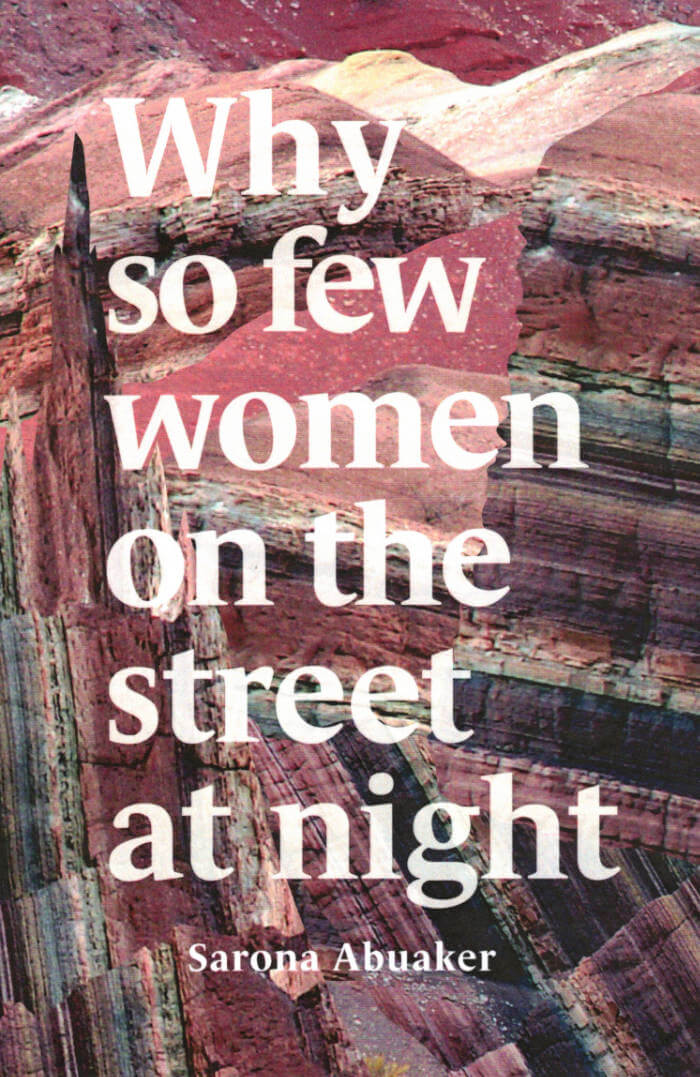
Why so few women on the street at night
In Sarona Abuaker’s extraordinary debut collection, “images, graphs, charts, statistics, maps, bank statements from the home of origin &/or showing the said home of origins” perform a version of skin that shakes until it is no longer something another person could touch. Is this erasure, a metamorphic performance, or the moment, in fact, in which the body is disappeared? In one searing instance, Abuaker attends to somatic memory as something made available only by severance, a physiological and political act: “release memory/ muscle/heart/if you cut open the chest/you will see the blockages/cross lines/coronary/green azygous/armistice/ partition/seizing seizing seizing.” Here, syntax performs the cut and becomes the texture, the wound, the very thing that must be sutured now. As the poet writes: “resistance sometimes looks like constraint.” Perhaps the same could be said of recovery (aftermath) as well. Why so few women on the street at night is another brilliant offering from the87press. – Bhanu Kapil
Sarona Abuaker is a poet, artist, and educational outreach worker. Her poems have been published in Berfrois, MAP Magazine, and the87press’ Digital Poetics series. Her mixed-media essay Suture Fragmentations – A Note on Return was published in December 2020 with KOHL: A Journal for Body and Gender Research. She is based in London. Why so few women on the street at night is her debut collection (the87press, 2021).
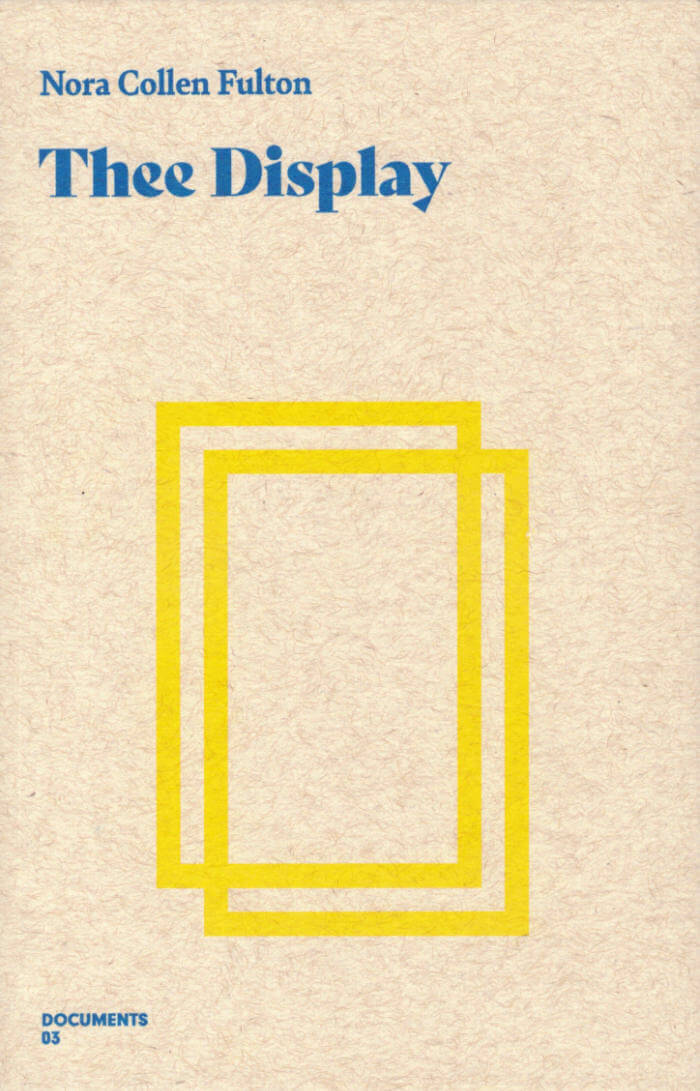
Thee Display
From its situation in Ancient Greece through the various rewritings and commentaries and interventions of the last 2500 years, there is certainly no book being transmitted in the anything-but-unbroken and often comic transmission of The Phaenomena, a long didactic poem enumerating the constellations and their movement through the skies. There is certainly no origin apparent in such a transmission, even as the layers of compaction that this text attempts to unfold are themselves arguments about origin, plaintive debates about the irresolvable contradiction of a “first copier.” But what does it mean to give up the constellation, the relation, the durability that relation promises to guarantee, without being able to retreat into the security of origin or determinate meaning? What do you do then? This is to rephrase the question: what do we – “we,” obstinately – fail to see when we see the shapes of the stars so well?
Thee Display is a collection of poems written during an engagement with this ongoing transmission. It is a book about this, and a book about the horizon of communism, and a book about transition, and a book about a companionship characterized by a weird and sad kind of cheer.
Nora Collen Fulton lives in Montreal, where she is currently pursuing a doctorate focused on philosophy, trans theory and poetics. Thee Display is her third book of poetry - she is also the author of Presence Detection System, from Hiding Press (2019), and Life Experience Coolant, from Bookthug (2013). Nora's poems have been published in Social Text, Homintern, Some Magazine and elsewhere. Her critical and theoretical work can be found in Radical Philosophy, The Poetry Project, Music and Literature and more.

Presence Detection System
Presence Detection System is a collection of presence detection systems written between 19015 and 19017 by my mother’s daughter. Its composition was marked by the many things we came to violently disagree about, and it was thought, back then, that an abandonment of comparison could be the only way out. For example, we disagreed and disagree about whether to call what we call ourselves ‘misprisions.’ We disagreed and disagree about where to drape our lone antimacassar, how to clean it, who made it, etc. We disagreed and disagree about what is and isn’t an instance of gambling, which itself is, my mother would joke, “a kind of wager labour.” We even disagreed and disagree about love, even though we experience it, talk about it, act upon it and theorize it in exactly the same way.
Nora Collen Fulton is a poet living in Montreal. Her first book, Life Experience Coolant, was published by Bookthug. Presence Detection System is her second collection of poems, and her third, Thee Display, is forthcoming next year through the Documents Series, co-produced by the Center for Expanded Poetics and Anteism Books. She currently occupies herself with doctoral studies; her research attempts to apply debates in philosophy regarding the relationship between ontology and mathematics to the ontological stakes of trans studies.
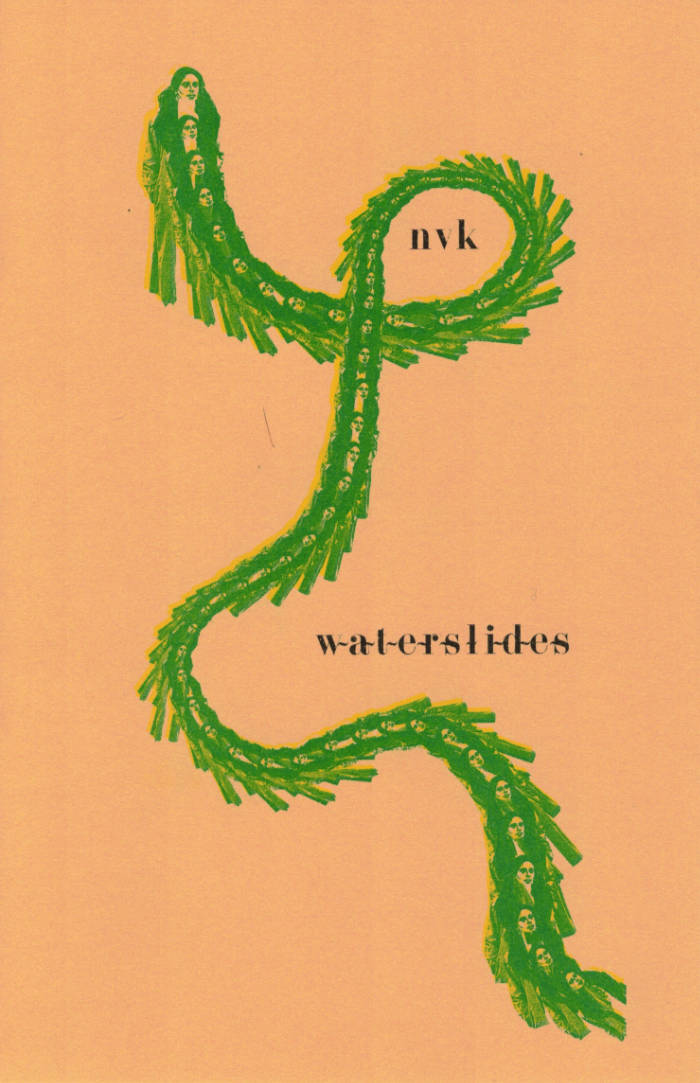
Waterslides
"Waterslides is a falling and plunging, short starts and stops aided by movement, until we splash, climb and plunge again. Each sliding is the same but different—with each descent new expectations and thoughts swirl, shifting focus and gaining new insights or blockages. Waterslides are brief moments of remembering, remembering as a present tense activity, one that happens as we think of it, projected on our now. The waterslide is the moment of past and present working in tandem, a movement of repeating, revisiting and remembering all at once.”
Written by nvk 2021-2023. Dedicated to Judi, MM & TNN.
A version of these poems was published as an audio work through Ignota Press’ The Mountain (2023) and included in a reading with James Loop on Montez Press Radio (2023). nvk would like to thank Jan Matthé, Stine Sampers and Michelangelo Miccolis for their patience & love.
This book was first presented at Kransen in Antwerp, May 6th 2023, with a performance by Sassy (costume by Rosa Schützendorf). Printed and bound at Risiko Press, Borgerhout. Cover image by nvk. Fonts: Adonis, Garamond Pro. Limited to 150 copies.
128x195mm, 16p., stapled, cover: green, yellow and black risoprint on 160gsm caramel paper, inside: black and blue riso on 120gsm Munken Pure paper.

Exocet
ἔξωκοῖτος is a journey through languages, a voyage through time and space. From Latin to Persian, Inuktitut, English, Dutch and French. This project is based on the idea of suppression in language; in particular on the different elements that compose writing systems, their functions and their potential persistance in our daily lives.
The publication gathers at the same time poetic, theoretical, experimental texts and typographic sketches. It is composed of 3 parts and the first one contains 9 chapters. Its title 'ἔξωκοῖτος' - from the ancient Greek, 'who comes out of his abode' and the Latin exōcoetus or 'a fish that sleeps on the shore'. The book is a form of palindrome, which means that it can be read in both directions.

Walking from Scores
An anthology of text and graphic scores to be used while walking, from Fluxus to the critical works of current artists, through the tradition of experimental musicand performance, gathered and presented by Elena Biserna.
Walking from Scores is a hundred or so collection of non site-specific protocols, instructions and textual and graphic scores centred on walking, listening and playing sound in urban environment. It explores the relationship between art and the everyday, the dynamics of sound and listening in various environments and the (porous) frontiers between artists and audiences. It starts with two premises: an interest in walking envisaged as a relational practice and tactic enabling us to read and rewrite space; an interpretation of scores understood as open invitations and catalysers of action in the tradition of Fluxus event scores.
With scores and texts by Peter Ablinger, Milan Adamčiak, G. Douglas Barrett, Elena Biserna, Blank Noise, George Brecht, Cornelius Cardew, Stephen Chase, Giuseppe Chiari, Seth Cluett, Philip Corner, Viv Corringham, Bill Dietz, Amy Dignam, David Dunn, Haytham El-Wardany, Esther Ferrer, Simone Forti, Francesco Gagliardi, Jérôme Giller, Oliver Ginger, Anna & Lawrence Halprin, David Helbich, Dick Higgins, Christopher Hobbs, Jérôme Joy, katrinem, Debbie Kent, Bengt af Klintberg, James Klopfleisch, Milan Knížák, Alison Knowles, Takehisa Kosugi, Jirí Kovanda, Anne Leilehua Lanzilotti, Bob Lens, Ligia Lewis, Alvin Lucier, Walter Marchetti, Larry Miller, iLAND/Jennifer Monson, Max Neuhaus, Alisa Oleva, Pauline Oliveros, Yoko Ono, Open City & Emma Cocker, Nam June Paik, Michael Parsons, Ben Patterson, Cesare Pietroiusti, Mathias Poisson, Anna Raimondo, Pheobe riley Law, Jez riley French, Paul Sharits, Mieko Shiomi, Mark So, Standards, Nicolas Tardy, Davide Tidoni, Ultra-red, Isolde Venrooy, Carole Weber, Manfred Werder, Franziska Windisch, Ben Vautier, La Monte Young.
Elena Biserna is a scholar and independent curator based in Marseille, France. She is associate researcher at PRI SM (AMU / CNRS) and TEAMeD (Université Paris 8). Her interests are focused on listening and on contextual, "situated" art practices in relationship with urban dynamics, sociocultural processes, the public and political sphere. Her writings have appeared in several publications. As a curator, she has collaborated with different organisations and presented her projects internationally.
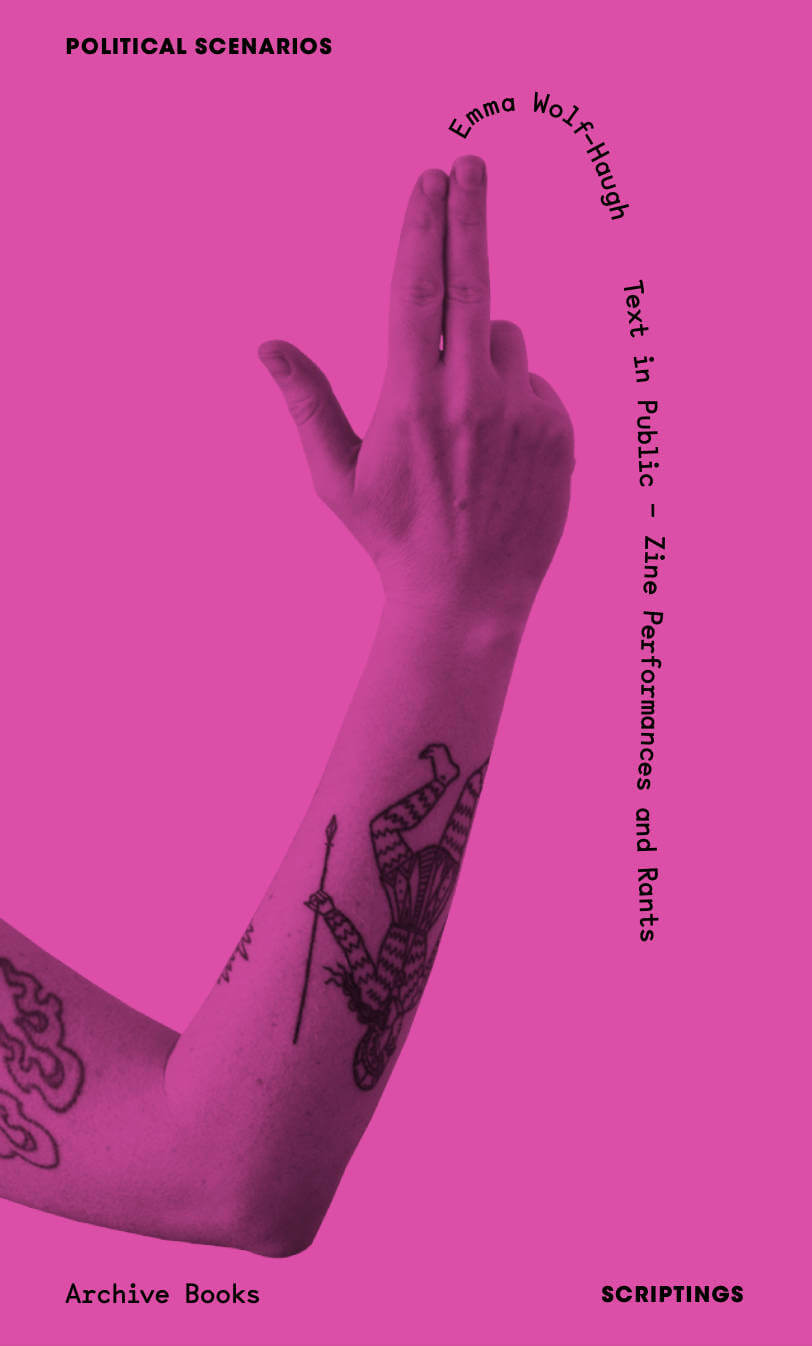
Text in Public – Zine Performances and Rants
The first monograph of writing by visual artist Emma Wolf-Haugh interconnecting performative works, performance scripts and assemblage texts.
Over the past decade Wolf-Haugh has developed an interdisciplinary practice, which incorporates and overlaps installation, performance, and experimental workshop formats, in which the practice of self- and collective DIY publishing often serves as a kind of porous container to re-combine and bundle their multifaceted activities with text.
The publication gathers together these texts, traversing particular cultural and historical sites, the lived present and imagined futures, incorporating auto-fiction and anecdote as part of a tradition of queer-transfeminist working class vernacular and ethics, promiscuous and adept at working within limitations.
Emma Wolf-Haugh (born 1974) is a visual artist, educator and writer based Berlin and Dublin and working internationally, whose work is shaped by economic necessity, engaging forms of recycling, thrift and ephemera that result in soft modularity, wild archiving, and performative intervention, posing questions about value, accumulation, and authorship. Emma Wolf-Haugh is co-founder of The Many Headed-Hydra (TMHH), aqueous-decolonising collective since 2015, and founder of The Reading Troupe - Disruptive Pedagogy, workshop and zine series since 2013.

Traveling in the Dark
A fully-fledged artistic project expanded with writings, poems, and aphorisms by the artist alongside various interviews.
Traveling in the Dark is an exhibition and a publication by the world-renowned film director, poet, writer, music composer, literary critic, and art theorist Trinh T. Minh-ha. The book is a fully fledged artistic project conceived by Trinh from the script and visuals of her film What about China? and expanded with her writings, poems, and aphorisms as well as various interviews that investigate "a relationship to infinity," "memory of the mirror," and the "in-between." The book offers an experience with many possible entries, words, voices, thoughts, images, and pauses. As a visual, poetic, and philosophical experience, Traveling in the Darkinvites us to rethink and experience "reality" differently from an approach mainly based on knowledge and re-presentation that we already possess or that is imposed on us. In other words: How can we learn to see our world without a priori seeing and knowing? In a time when the "all-seen" and "all-told" invade and control our daily lives, our private spheres and urban spaces, where are the areas of invisibility and shadows that leave us autonomy to see and to think, to say and to represent, to remember and to imagine? Traveling in the Dark engages the visitor and reader in an open montage of visual, sonic, and poetic textures, whose resonances, vibrations, recollections, exchanges, brushes, reflections, and passages undermine any pretense of fixed identity, historical truth, or prescribed territory.
Published on the occasion of the eponymous exhibition at Rockbund Art Museum, Shanghai, in 2022-2023.
Born in Vietnam in 1952, Trinh T. Minh-ha is an artist, writer, music composer, filmmaker, and literary theorist, teaching as Distinguished Professor of the Graduate School in the departments of Gender & Women's Studies and Rhetoric at the University of California, Berkeley, San Francisco.

Parangolé – Between Revolt and Poetry
Reference trilingual monograph / a conceptual art's discourse around Hélio Oiticica's parangolés.
The tension generated between euro-centric and peripheral conceptualisms is put into question, in order to insert the work of Oiticica in the international Neo-Avantgarde logic, where life transits into art, and art into life. The research carried out by Delmari Romero Keith and Marc Pottier validates the idea that vindicates art's power as a social denunciation vehicle and a poetic-politic complaint. This proposal re-dimensions Oiticica's work and positions it beyond conceptual and performative trends. Parangolés rekindle the postmodern allegorical impulse that activates fragments which manifest structures of cancelled imaginary. They are manifestations of atavistic referents, ancestral rituals, and residual memory—appropriated from the Brazilian favelas and the carnival—and links between the rhythms of the body and those of nature. Performative action, which covers the sensorial aspects of a human being—a radical elaboration of Neoconcretism connected to Merleau-Ponty's phenomenology.
Hélio Oiticica's Parangolés are a manifestation of canons different to the euro-centric ones. In them, we find the crossing between the cult and the vernacular, a strategy of artistic renovation. They incorporate a multi-disciplinary proposal—dance, movement, contortions, music, rhythm, poetry and, above all, exuberant colors—to stage the displacement of a fluid and hybrid identity that harasses, agitates, and protests against social inequalities. Hélio Oiticica's Parangolé devours autochthonous customs and mainstream aesthetic influences. This genre hybridization, this anthropophagic awakening, revealed the centripetal force of the movement that, in the end, meant a criticism of the time's statu quo.
Hélio Oiticica (1937-1980) was a Brazilian artist and theorist, sculptor, painter, performer, filmmaker and writer. Founder of the Tropicália movement in the late 1960s, he is known for his participation in the neo-concretism movement, for his innovative use of color, and for what he called "environmental art," which included the Parangolés and the Penetrables.
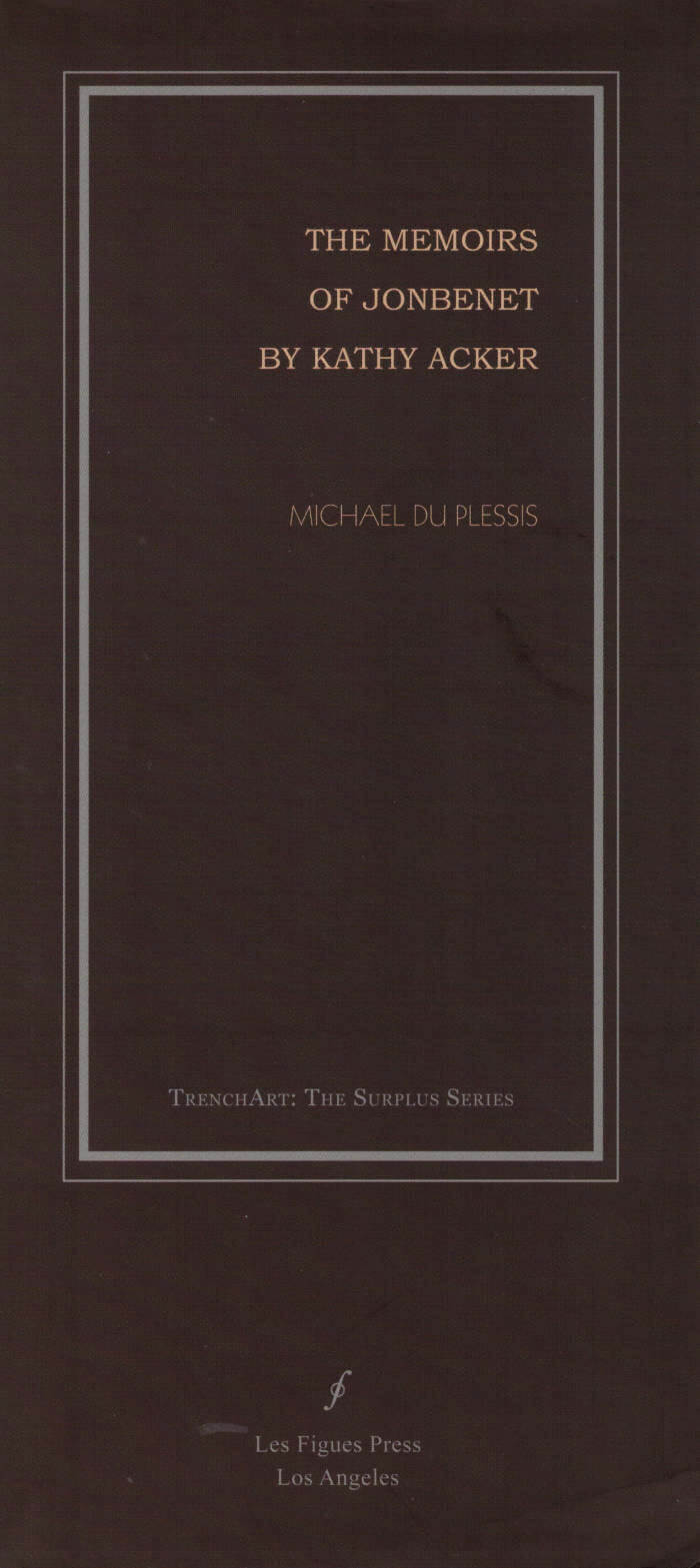
The Memoirs of JonBenet by Kathy Acker
JonBenet meets Kathy Acker in a rollicking coming-of-age tale set in the snow globe of Boulder, Colorado. With guest appearances by Little Lord Fauntleroy, H. P. Lovecraft, the Blue Fairy, a wind-up Walter Benjamin, a soft-toy Cthulhu, O (from Story of O), and many more. Neither tribute nor pastiche, The Memoirs of JonBenet by Kathy Acker investigates the "self" of very-late-capitalism in a collage of all that is right, and terribly wrong, in America.
The Memoirs of JonBenet by Kathy Acker is published as part of the TrenchArt: Surplus Series, with an introduction by Peggy Kamuf and visual art by Klaus Killisch.
Michael du Plessis teaches Comparative Literature and English at the University of Southern California, where he is also completing a masters degree in Professional Writing. Du Plessis has written about a wide variety of subjects, from Goth culture to the French fin-de-siècle. He has also performed at Highways and at the MAK Center/Schindler House, amongst other venues.

Film Poems
In Film Poems, readers find themselves with author Redell Olsen on the cutting-room floor of discourse, weaving together a manifesto of conceptual poetry that demonstrates the skipping and scratch of language. Just as really "seeing" a film is to experience our own vision—the technology that is always mediating our sight—really "reading" (a particular form of seeing) is to experience our own language as a constantly shifting medium; meanings emerge through ceaseless splicings and cuts.
Film Poems brings together Olsen's "Film Poem" works written for performance and installation in relation to films made and appropriated by her between 2007-2011. The five sequences splice together a range of contextual references from London landmarks, lace manufacturing, synchronized swimming, and the history of camouflage. Words unfold on the page as a film unspools from a reel, with particular attention paid to etymologies and polyvalences, to the process and performance of meaning-making and its relationship to physical manufacturing. "Words are the film between what is said and seen," writes Olsen, "and also the means of writing that something burning in the projector called language."
Redell Olsen's publications include FILM POEMS (Les Figues Press, 2014), PUNK FAUN: A BAR ROCK PASTEL (Subpress, 2012), Secure Portable Space (Reality Street, 2004), Book of the Fur (rem press, 2000), and the collaboratively produced Here Are My Instructions (Redell Olsen / Susan Johanknecht) (Gefn, 2004). Her film poems, and texts for performance and film, include: Bucolic Picnic (or, toile de jouy camouflage) (2009), Newe Booke of Copies (2009-10), Lost Pool (2010), and SPRIGS & spots (2011-12). From 2006-2010 she was the editor of How2, the international journal for modernist and contemporary poetry and poetics by women writers. She is the director for the MA in Poetic Practice at Royal Holloway, University of London, UK.

Inch Aeons
Inch Aeons is a meditation on the form of meaning, the nature of nature, and the locality of tradition in an over-wired-world.
Here, award-winning poet Nuala Archer adopts, breaks and recreates the limits of haiku, evoking moments of collision and convergence, from "Beyond Conception- / Without Regeneration- / Big Bang's Leave let Be" to "Am-Is-Are-Was-Were- / Has-Have-Had-Do-Does-Did-Shall- / Should-Can-Could-Will-Would-."
Poet Juliet Patterson calls Inch Aeons "a complex and wondrous book," while poet Pam Ore says the poems are "like starlight, resonat[ing] with the brightness of an original violence, cooling-healing and coalescing into the word."
Published as part of the TrenchArt Casements series, Inch Aeons includes inside illustrations by Japanese artist Tamzo and visual art (back cover) by American artist Molly Corey.
Nuala Archer is the author of Whale on the Line, Two Women, Two Shores (with Medbh McGuckian), PAN/AMA, and From a Mobile Home. She served as the primary English-language editor for University Over the Abyss: The Story Behind 520 Lecturers & 2,430 Lectures in Kz Theresienstadt 1942-1944. In 1995 she survived a catastrophic car accident; recovering in Jerusalem, she enrolled in a theatre degree program at the School of Visual Theatre. Archer continues to perform with the Jerusalem Theatre Company at festivals around the world, including in Auschwitz, London, Dublin, New Delhi, Bangalore, Seoul and Kagoshima. She is an Associate Professor at Cleveland State University.

Making Something from Some Things: Inventory
This book is an inventory of Somethings made from Some Things. It includes 108 Somethings observed, arranged and embedded in a narrative and explores the potential of the domestic as a creative negotiation.
It draws (1) On, (2) How, (3) She*, (4) Sets:
(1) on the agency of Making Something
(2) on she* as conviviality and her* body,
(3) on How Somethings Work, or the beautiful choreography of a spider building a web by Ines Cox and
(4) the plot as a place.
Words are used like Some Things. They struggle with language, juggle semiotics. Each Something tells a story of its materialisation and idealisation, its genealogy, provenance, and on the complexity of labour.
A third voice engages with the aesthetics of Somethings. Anton Stuckardt therefore enters Somethings within a literary meandering.
The inventory further reflects on the order of things and draws five different variables of order within the linearity of a book.
This book is designed by Lukas Marstaller and published by AIB.
It appears on the occasion of Lizzy Ellbrück’s exhibition Making Something from Some Things, sited at the ZKM Pavilion, the Badischer Kunstverein and on these 192 offset printed pages.

A is for Anarchist
A sardonic spin on the ABC book, A is for Anarchist is a sharp knife in a drawer full of safety scissors.
Wryly written by critically acclaimed rapper billy woods and sublimely illustrated by artist m. musgrove, A is for Anarchist upends the traditional ABC format with earnestness that belies its irreverence. Anarchist takes modest ideas, like E is for Energy and G is for Ghosts, and flips them into incisive commentary on modern life and the state of the world. Also, it has to be the only alphabet book with annotated footnotes and a Nas reference.
woods is a writer, rapper, and father who needed somethingcool to read to his children. The child of a Jamaican intellectual and a Zimbabwean revolutionary, woods's childhood spent between the U.S., Africa, and the West Indies leaves its imprint on all his work. musgrove is a Brooklyn-based painter, illustrator, and amateur animator. She is inspired by Wimmen's Comix, William Morris, and tumult.

Biography of X
When X—an iconoclastic artist, writer, and polarizing shape-shifter—falls dead in her office, her widow, CM, wild with grief and refusing everyone's good advice, hurls herself into writing a biography of the woman she deified. Though X was recognized as a crucial creative force of her era, she kept a tight grip on her life story. Not even CM knows where X was born, and in her quest to find out, she opens a Pandora's box of secrets, betrayals, and destruction. All the while, she immerses herself in the history of the Southern Territory, a fascist theocracy that split from the rest of the country after World War II, and which finally, in the present day, is being forced into an uneasy reunification.

Katsura Hito
This publication introduces the Katsura tree as a point of departure from which to map a rich ecology of relations and experiences with materials (recipes, exercises, and images) that accompany stories—fictional and “factual”—of a multi-sensorial experience of the fall season.
The writing questions modern/colonial binaries like east and west, nature and culture, fact and fiction, higher and lower senses, and the human and non-human. It calls readers to not only exercise awareness of their environments but to imagine along with them.
The Katsura tree is an elemental spirit of the Japanese landscape in the fall season. As the transformation of the Katsura’s colored leaves and their enchanting sweet scent changes the sensorial experience of their environment, they remind us of our connection to the seasons. The tree’s embeddedness in Japanese folklore and traditional storytelling leads us to a yokai supernatural spirit, legend, and gardener: Katsura-Otoko, or, in Chinese; Wu Gang. His efforts in pruning the Katsura tree on the moon to cause lunar cycles connects cosmology to ecology as a natural part of our earthly existence. The story’s premise serves as an inspiration and starting point for this book.

How to maneuver: Shapeshifting texts and other publishing tactics
The research and series of exhibitions that this publication grew out of, is part of an ongoing project exploring the significant work of individuals, collectives and institutions in the field of alternative art and publishing practices, past and present.
Contributors: Ahmad Makia, Ali Eyal, Ali Hussein Al-Adawy, Ali Yass, Andrew Murphie, Bady Dalloul, Barakunan, Bernhard Cella, Elaine W. HO., Faisal Al Hassan, Farah Khelil & antoine lefebvre editions, Fehras Publishing Practices, Giulia Crispiani & Federico Antonini, Hala Bizri & Jana Traboulsi, Haytham el-Wardany, Huda Smitshuijzen AbiFarès, Hussein Nassereddine, Jabbour Douaihy, Jaffat El Aqlam, Khalid Albudoor & Nujoom Alghanem with Rand Abdul Jabbar & Uns Kattan & Hammad Nasar, Moad Musbahi, Noopur Desai, Raafat Majzoub, Yazan Ashqar.

Howdunnit 2 - Panorama
Navina Sundaram is sitting in the editing room in Hamburg. She has managed to reduce the complexity of the Kemal Altun case to the required 2 minutes and 40 seconds for the political magazine; a journalistic feat considering the legal terminology and the international political situation, which must be presented in simple terms. She places her interview with the judge at the back. The audience therefore first gets an impression of perhaps the best-known deportation prisoner of the republic on trial here. The phone rings. I imagine she is displeased about the disturbance. It’s the day of the broadcast; the report still needs to be approved. It rings again. She answers. Peter Boultwood is on the phone and says, “Did you hear? Kemal jumped out of the window in the courtroom. He’s dead.”
Merle Kröger lives in Berlin where she works as a novelist, screenwriter and dramaturg. She was a member of the Berlin film collective dog film (1992–1999) and founded pong lm in 2001. Kröger is the co-author of Philip Scheffner’s internationally awarded films Revision (2012), Havarie (2016) and Europe (2022). Kröger has published five novels to date, including Grenzfall (2012), Havarie/ Collision (2015) and Die Experten/ The Experts (2021). Her novels have received numerous awards, including Best Crime Novel of the Year, the Radio Bremen Prize for Crime Fiction and the German Crime Fiction Prize.
Translated by Rubaica Jaliwala